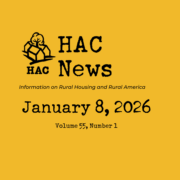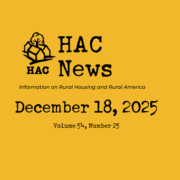HAC News: February 19, 2026
TOP STORIES
USDA significantly changes 502 direct program
The Rural Housing Service issued revisions to its Section 502 direct mortgage program on February 10, effective immediately, by changing provisions of its Handbook HB-1-3550. The changes include limiting loans to 60% (rather than the previous 80%) of HUD Section 203(b) loan limits, capping the packaging fee at $750 (rather than the previous $1,750-$2,000), requiring USDA RD state directors to approve each loan at two different points, excluding SNAP benefits from repayment calculations, and more. The agency’s handbooks do not have the legal effect of regulations, and handbook changes do not require public notice and an opportunity to comment. HAC and others are attempting to communicate with RHS about the changes and the process.
Housing bill passes House, Senate action expected soon
On February 9 the House approved the Housing for the 21st Century Act (H.R. 6644) by a vote of 390 to 9. The White House expressed disappointment that the bill does not include a ban on institutional investors purchasing single-family homes. The Senate may take up its ROAD to Housing Act (S. 2651) during the week of February 23. HAC has endorsed both the House and Senate bills. The House bill includes some provisions regarding USDA’s rural housing programs and the Senate bill includes the full Rural Housing Service Reform Act. Supports for Community Development Financial Institutions, including expanding USDA’s Native CDFI lending program, may be added to the Senate bill. Comparisons of the two bills are available from several sources including Novogradac, the Bipartisan Policy Center, and the National Council of State Housing Agencies.
HUD proposes ending prorated assistance for mixed-status households
A proposed rule would end HUD’s current practice of prorating assistance based on the number of people in a household with U.S. citizenship or eligible legal status. Housing providers would be required to verify the status of every household member, including seniors. Those without legal status would not be permitted to live in HUD-assisted housing. Comments are due April 21.
RuralSTAT
The homeownership rate for Black households in rural areas is 53%, eight percentage points higher than the rate for Black households nationally. At the same time, the rural Black homeownership rate is 20 percentage points lower than the 74% overall rate of homeownership in rural America. Source: HAC tabulations of the U.S. Census Bureau’s 2020-2024 American Community Survey.To learn more about heirs’ property and title resolution for your community, visit Heirs’ Property Central.
To learn more about homeownership in your community, visit Rural Data Central.
OPPORTUNITIES
HAC offers technical assistance for service coordination at Section 515 properties
With support from the AARP Foundation, HAC is offering free technical assistance to Section 515 property owners and managers. HAC will help a cohort of eight to ten owners and managers to build service coordination programs in elderly-designated 515 properties by utilizing the normal RD budget process. More information is posted on HAC’s website here and here. Apply by March 15. Anyone interested in attending an informational session in the coming weeks should contact Angela Shuckahosee, HAC, angela@ruralhome.org, 216-815-0114. For questions about the program, contact Seth Leonard, seth@ruralhome.org.
CAPITOL HILL
Farm Bill proposal released in House
On February 13 Rep. Glenn Thompson (R-PA), Chair of the House Agriculture Committee, released the text of a proposed 2026 Farm Bill. The committee will begin considering the bill on February 23. Like most farm bills, this one does not cover USDA’s housing programs (they do not fall under the Agriculture Committee’s jurisdiction), but it does include some rural development provisions, including one directing USDA to “provide technical assistance and strengthen local capacity to improve access to rural development programs administered by [USDA] for local partners (including local governments, cooperatives, businesses, and community anchor institutions) in geographically underserved and distressed areas.” The bill does not authorize any funding for this capacity building, however. The Senate Agriculture Committee has not yet released its Farm Bill draft.
Hill hearings consider housing issues
The House Financial Services Committee and two of its subcommittees held hearings on housing topics on February 10 and 11: Priced Out of the American Dream: Understanding the Policies Behind Rising Costs of Housing and Borrowing; Homeownership and the Role of the Secondary Mortgage Market; and Building a Solid Foundation: Restoring Trust and Transparency in Public Housing Agencies. Recordings of all three events are available online.
REGULATIONS AND FEDERAL AGENCIES
HUD offers toolkit to help share NAHASDA stories
In recognition of the 30th anniversary of the Native American Housing Assistance and Self-Determination Act of 1996, HUD has posted a communications toolkit and graphics that Tribes and others can use to publicize the impact NAHASDA has had in Tribal communities.
EVENTS
Webinar will cover activating rural investments in Opportunity Zones 2.0
Opportunity Zones 2.0: A Guide for Activating Rural Investments, presented by HAC, Partners for Rural Transformation, and Hope Policy Institute will introduce a new guide titled Activating Rural Investments in the Next Round of Opportunity Zones: Recommendations for States. This presentation will equip governors, state policymakers, regional development hubs, and local nonprofit leaders with actionable steps to maximize rural investment through Opportunity Zones 2.0. Speakers will cover all things rural OZs: what has changed, what’s at stake, and where state leadership matters most. Grounded in lessons from OZ 1.0 and real rural case studies, it will offer concrete recommendations states can act on now to ensure OZ 2.0 delivers transformative rural investment.
Rural housing needs assessments webinar set
The Minnesota Housing Partnership will present a webinar titled From Data to Decisions: A Practical Guide to Community-Driven Housing Needs Assessments on February 24. The session will introduce a guide to conducting housing needs assessments that are grounded in local context and designed to inform real decisions, focusing on rural and small communities and Native Nations. The framework is intended to help communities adapt the process to their capacity, data availability, and goals, without relying on a one-size-fits-all approach.
PUBLICATIONS AND MEDIA
Report offers insurance strategies for multifamily affordable housing
Curbing the Insurance Spiral: Policy and Practitioner Strategies to Help Stabilize Multifamily Affordable Housing, published by Enterprise Community Partners, explores the growing insurance challenges for housing providers. The report includes practical guidance for practitioners and policymakers.
HAC
HAC opposes eliminating fair housing disparate impact rules
HAC submitted written comments responding to HUD’s proposal to eliminate its fair housing rules addressing on disparate impact – the legal concept that conduct is discriminatory if it has inequitable effects, even if there was no intent to discriminate. HAC’s comments strongly urge HUD to retain and enforce its current rule. HAC argues that disparate impact helps connect housing affordability and fair housing, rural residents need protection against differing impacts of facially equal treatment, HUD erred in interpreting court decision on disparate impact liability, and HUD has an explicit statutory responsibility to ensure equal opportunity and freedom from discrimination. HAC also joined a comment letter submitted by the National Housing Conference and several other organizations.
HAC is hiring
HAC job listings and application links are available on our website.
Need capital for your affordable housing project?
HAC’s loan fund provides low interest rate loans to support single- and multifamily affordable housing projects for low-income rural residents throughout the U.S. and territories. Capital is available for all types of affordable and mixed-income housing projects, including preservation, new development, farmworker, senior and veteran housing. HAC loan funds can be used for pre-development, site acquisition, site development, construction/rehabilitation and permanent financing. Contact HAC’s loan fund staff at hacloanfund@ruralhome.org, 202-842-8600.
Please note: HAC is not able to offer loans to individuals or families. Borrowers must be nonprofit or for-profit organizations or government entities (including Tribes).
Want to reprint a HAC News item?
Please credit the HAC News and provide a link to HAC’s website. Thank you!



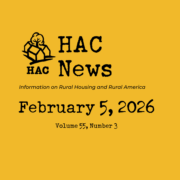

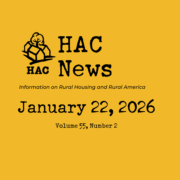
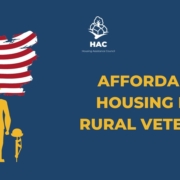 Housing Assistance Council
Housing Assistance Council